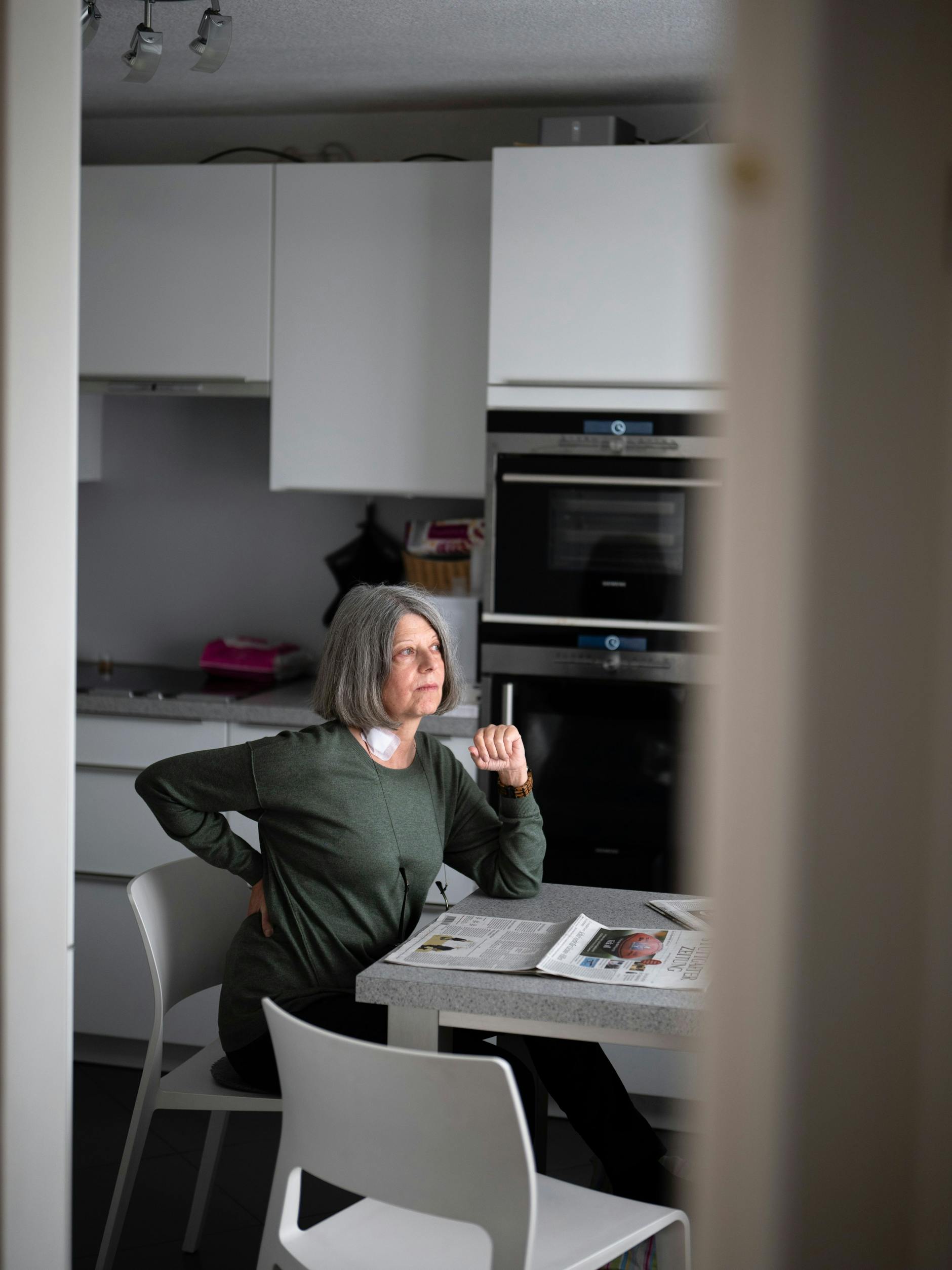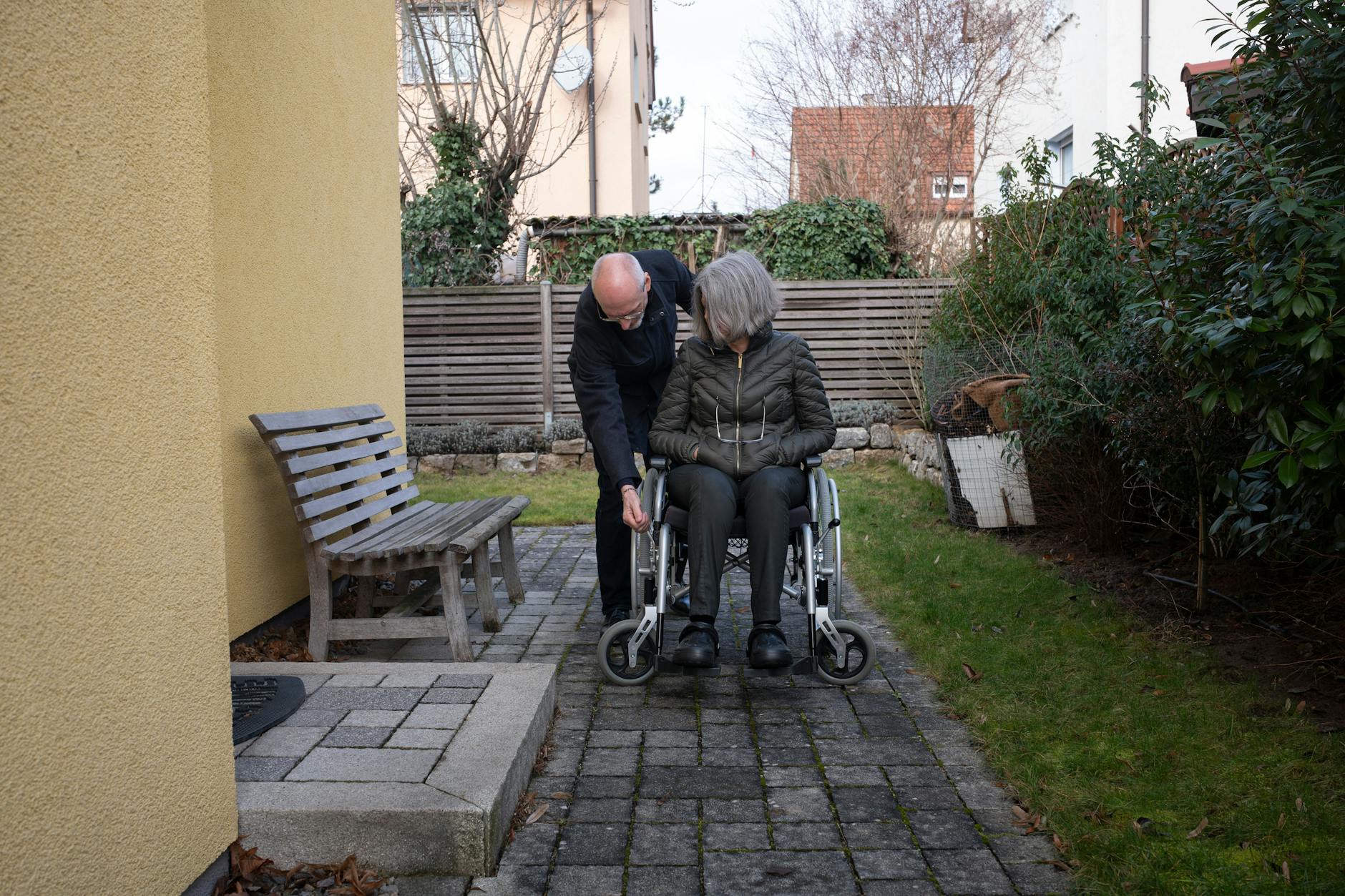Seriously ill after corona vaccination: Why isn't the government helping this woman?

On paper, the case seems clear. Four university hospitals have certified that Erika Seebacher's complaints are related to her coronavirus vaccination. These aren't reports from private doctors, but rather medical reports from four different teaching hospitals. Patients can hardly provide much more than that when applying for recognition of vaccine damage, as the Stuttgart resident did.
However, it's not the university doctors who decide on recognition—they are representatives of the professional association and the social security office. Last year, both rejected Erika Seebacher's applications. A few weeks ago, her appeal against the social security office also failed.
Hardly any "post-vaccine" case is as well documented as this one, which is why it symbolizes all those who became ill after vaccination and who are making no progress in their fight against bureaucratic windmills, despite promises of help from politicians and laws. In March 2024, the Berliner Zeitung first reported on her case , at which time the speech therapist said: "I want justice." She is now seeking justice in court: The 64-year-old has filed a lawsuit against the social security office, which has refused to recognize vaccine damage.
She thought she had overdone it in sportsErika Seebacher has now been ill for more than four years. The symptoms began at the end of May 2021, eleven days after her second vaccination, and were severe: From one day to the next, the athletically active woman could no longer walk.

To this day, she relies on a wheelchair and the assistance of her husband to get through everyday life. Sleep disturbances, severe pain, gastrointestinal problems, dizziness, circulatory problems, difficulty concentrating: the list of symptoms is long. One of the repeatedly confirmed diagnoses: ME/CFS, a chronic multisystem disease. Seebacher was assigned care level 3 and has an 80 percent disability.
At first, she thought she'd overdone it with exercise. It took some time for doctors to point out that the problems might have been caused by the vaccination. She visited several dozen practices before the first university hospital confirmed what practicing physicians had already suspected: "chronic fatigue syndrome after COVID vaccination." A second university hospital initially classified the symptoms even more cautiously, "most likely in the sense of post-vaccine syndrome." A third wrote that Seebacher was suffering from "chronic fatigue syndrome after COVID vaccination." To this day, Seebacher regularly visits one of the university hospitals for autoimmune therapy, every six months if her condition has worsened further with time since the previous treatment session.
Erika Seebacher was never anti-vaccine. While the data researchers have compiled four and a half years after the first coronavirus vaccinations do not paint a consistent picture, they leave no doubt that, overall, the vaccines prevented a great deal of suffering. In 2022, British modelers estimated that almost 20 million lives were saved worldwide. In retrospect, the World Health Organization cites significantly lower figures , but even vaccine-skeptical epidemiologist John Ioannidis of Stanford University in the United States recently concluded in a comprehensive study that the vaccines prevented 2.5 million deaths worldwide—one for every 5,400 doses.
Vaccination likely also reduces the risk of long-term complications after a coronavirus infection (post-COVID). It is undisputed that the vaccines also have side effects, even if serious damage is relatively rare . However, because there was an official recommendation for coronavirus vaccination, lawmakers promised that those affected would not be left alone with their vaccine damage. They could receive help; all they needed was recognition from official bodies, especially social security offices.
The reality is different. A survey of all federal states shows that since the start of the coronavirus vaccination campaign in late 2020 until mid-2025, more than 14,000 applications for recognition of vaccine damage were received by social security offices in Germany. The authorities have now made final decisions on almost 10,000 applications – and recognized vaccine damage in only 633 cases. This corresponds to a rate of 6.5 percent of applications that were decided on the merits.
Authorities are skeptical about “Post Vac”In Berlin, the proportion of positive decisions is well above average at more than eleven percent, and in Baden-Württemberg, where Erika Seebacher lives, it's still more than eight percent. However, this doesn't help much in individual cases—especially when it comes to "post-vaccination."

This term has become established in the public domain for post-COVID-like symptoms that occur after vaccination. Medically, it is neither precisely defined nor generally accepted. The Paul Ehrlich Institute (PEI), the state-run institute responsible for vaccine control , does not recognize "post-vaccine" as a consequence of vaccination . Myocarditis or pericarditis, cerebral thrombosis, or Guillain-Barré syndrome, a neurological disorder: the PEI has registered all of these conditions as rare but serious consequences of vaccination. In the case of post-vaccine, there is a lack of understanding of the mechanisms that lead from vaccination to symptoms.
In March 2022, once her diagnoses had been confirmed, Erika Seebacher initially applied to the German Employers' Liability Insurance Association for Health Services and Welfare (BGW) for recognition of the consequences of the vaccination as an occupational accident. In October of the same year, she also submitted an application for recognition of vaccine injury to her social security office, located in the Böblingen district. After that, nothing happened for a long time.
With recognition, the Stuttgart resident would gain access to benefits that go beyond what her health insurance pays: Whether she receives certain pension payments and subsidies for aids such as wheelchairs does not depend on how ill she is, but rather on whether the social security office and the employers' liability insurance association come to the conclusion that she is so ill because of the vaccination.
But it's not just about money for her. Erika Seebacher wants the government to acknowledge why she was so suddenly torn from her previous life: because she followed an official recommendation and got vaccinated. That's the only reason she feels so bad today.
In March 2024, the doctor from the social security office concluded, based on the files, that Seebacher's "severe suffering (...) was clearly evident." However, for vaccine damage to be recognized, it must be "unequivocally established" that the "health disorder" arose as a result of the vaccination, and "that is not the case here." Based on this assessment, the Böblingen District Office rejected Seebacher's application in April of last year. Its decision also stated that the alleged foot pain had been documented since 2010, thus "long before the vaccinations." Erika Seebacher cannot determine where—because in fact, nothing of the sort is apparent from her records.
Less than two weeks after receiving the notification, she returned to the University of Tübingen's Neurology Clinic for another visit. She stayed for more than two weeks, during which doctors thoroughly examined her and ultimately concluded: "In our view, given the proximity in time between the COVID vaccination and the onset of symptoms, it would be plausible that there is also a probability of a causal connection."
The fatal verdict of an expertFollowing the pension office's decision, the process at the employers' liability insurance association is finally gaining momentum. Statistically speaking, the chances are better here: By the middle of this year, the BGW had already decided on 551 applications for recognition of vaccine injury as an occupational accident, and approved it 214 times – or almost 40 percent of the cases. The fact that this rate is so much higher than at the pension offices is primarily due to the fact that even temporary health damage resulting from vaccination is considered an "occupational accident," whereas only persistent complaints are considered "vaccine injury."

To review Erika Seebacher's documents, the BGW commissioned Wolfgang Hausotter to provide a "consulting medical opinion." The practicing neurologist from Sonthofen is a much sought-after expert witness, but his relationship with the diagnosis of ME/CFS is a difficult one. Between 2002 and 2013, Hausotter published a book, which went through three editions, in which he treated Chronic Fatigue Syndrome as a "functional disorder." He pointed to the "purely subjective complaints" and found it "quite convincing" to view the illness as a "special form of anxiety neurosis."
Why should Hausotter, of all people, evaluate the case of someone suffering from ME/CFS? In response to a query, the BGW stated that Hausotter is "a very experienced physician" and that there is "no reason to doubt his high professional qualifications." As a consultant, he is also obligated to continue his training and keep his knowledge up to date. However, a spokesperson for the employers' liability insurance association also stated that they do not further verify the level of knowledge of their consultants.
Hausotter's book, last revised in 2013, the spokesperson ultimately argues, could not possibly be "in line with current scientific knowledge." Which is, of course, true. On the other hand, however, the World Health Organization had already classified ME/CFS as a neurological disease in 1969, rather than a "functional disorder."
Regarding the Seebacher case, Hausotter wrote in July 2024 that there was "no clear diagnosis," and that chronic fatigue syndrome "cannot be objectively diagnosed." The neurologist did not address the fact that there are recognized diagnostic criteria for ME/CFS, which the patient met after confirmation by several doctors, but instead pointed to symptoms that had already occurred before the vaccination. Erika Seebacher denies this.
Hausotter did not respond to a query from the Berliner Zeitung. In his statement, he concludes that "full proof" of vaccine damage is "far from being provided."
The diagnosis of the fourth university hospital confirms the vaccine damageFor a professional association to recognize vaccine injury, a medically confirmed diagnosis must be available. Furthermore, the causal connection to the vaccination must appear "sufficiently probable."

But when is that fulfilled? Just a few days after neurologist Hausotter examined her files in the Allgäu region, Erika Seebacher undergoes a thorough examination at a fourth university hospital: the Post-Vaccine Outpatient Clinic in Augsburg. The doctors who sign the report there clearly have no doubts. They note the diagnosis: "Post-acute COVID-19 vaccination syndrome." They continue: "In our opinion, in Ms. Seebacher's case, (...) no other diagnosis comes into question than clear chronic fatigue syndrome (ME/CFS) as a result of the SARS-CoV-2 vaccinations." The symptoms "are to be seen as a consequence of the vaccination."
Nevertheless – and although the BGW claims to recognize the diagnostic criteria for ME/CFS and the distinction between this illness and a functional disorder – the employers' liability insurance association follows its consulting physician and refuses to recognize Seebacher's application. In its decision, it argues that there is "no sufficient probability" that the symptoms are related to the vaccinations.
Erika Seebacher received her most recent rejection this June. Her appeal against the Böblingen Pension Office has since been forwarded to the Stuttgart Regional Council, which rejected her appeal as "unfounded." The reason for this was not explained.
Neither the Böblingen District Office nor the Stuttgart Regional Council declined to comment on their decisions to the Berliner Zeitung. They cited ongoing proceedings, as Erika Seebacher has since appealed to the Stuttgart Social Court. She now intends to seek recognition of the vaccine damage through legal action.
The employers' liability insurance association hasn't reached that point yet; the appeals process is still ongoing. The BGW has again consulted neurologist Wolfgang Hausotter, who this time writes: "A neutral neurological assessment" is urgently recommended, specifically "at a university hospital with special experience with vaccine reactions" – as if this hadn't already happened.
Erika Seebacher's fight will continue. After the previous rounds, she realizes how let down she feels by all the promises. "I haven't received any help from official sources," she says. Instead of help and solidarity, the authorities only constantly put new obstacles in her way. "Obstacles that drain the last of the strength of seriously ill people like me," she says. And asks: "Where is the social outcry?"
Berliner-zeitung





